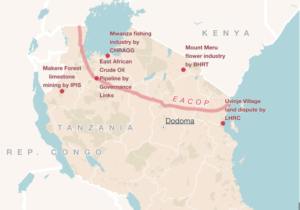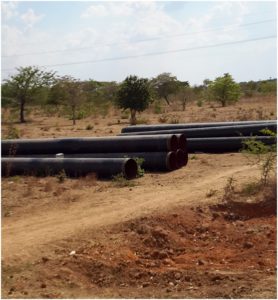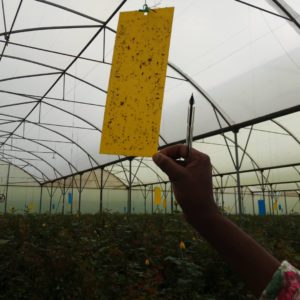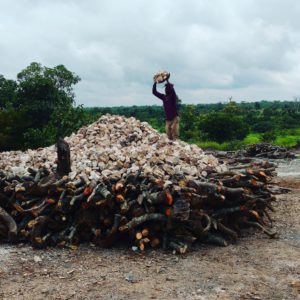“Voices from Tanzania – case studies on Business and Human Rights (Volume 1)” presents five studies on pertinent corporate human rights issues in Tanzania as conducted by Business and Human Rights Tanzania (BHRT), the Commission for Human Rights and Good Governance (CHRAGG), Governance Links Tanzania, the Legal and Human Rights Centre (LHRC) and IPIS’ project manager in Tanzania.
The case studies present different aspects of how business operations can impact human rights, including labour rights, the right to health, security, free speech, property and adequate living standards. The studies combine new field data, obtained through e.g. stakeholder interviews, observations or questionnaires, with secondary data sources such as (inter-)national legal frameworks, published reports or company (policy) documents. The analyses present previously undocumented information, provide new insights and allow the formulation of clear recommendations to the different stakeholders involved.
The publication offer present-day cases from four major economic sectors in Tanzania: resource extraction, agriculture, tourism and infrastructure.
A diverse range of human rights topics are studied, from human rights issues to watch during the planned construction of the East African Crude Oil Pipeline, to labour rights issues in the fish processing and cut flower industries of Mwanza and Arusha respectively, to the tense relation between tourism investment and land rights in Sadaani National Park, and that between forest conservation and limestone mining in Kigoma Region.
Download the publication in pdf
First, Governance Links Tanzania takes a critical look at the “Human rights issues to watch in the construction of the Tanzania section of East African Crude Oil Pipeline project”. In their implementation, large infrastructure projects touch upon multiple basic human rights, including workers’ rights, property rights, the right to safe and healthy living conditions, and the right to effective remedy if rights are violated. Considering the magnitude and trajectory of the East African Crude Oil Pipeline – the 1,149 km long pipeline cuts across eight regions in northern Tanzania -, and the number of (inter-)national stakeholders involved, this project provides an interesting case to raise awareness on corporate human rights issues to consider in infrastructure projects.
 Secondly, the Tanzanian Commission for Human Rights and Good Governance (CHRAGG) presents its findings on “Labour rights and access to remedies by workers in fish processing industries in Mwanza city”. Combining literature reviews with field studies conducted in three fish processing industries located in Mwanza Municipality, CHRAGG evaluates the implementation of labour rights and standards in this agricultural sector. It also investigates the extent to which workers in the fish processing industry have access to remedy through non-judicial mechanisms. As the first dedicated study on human rights in the fishing industry in Tanzania, this contribution offers crucial insights into a sector that has remained understudied so far. The study points towards the most urgent issues to be solved and suggests steps to be taken to ensure that labour rights are promoted and protected, and access to justice is guaranteed for all.
Secondly, the Tanzanian Commission for Human Rights and Good Governance (CHRAGG) presents its findings on “Labour rights and access to remedies by workers in fish processing industries in Mwanza city”. Combining literature reviews with field studies conducted in three fish processing industries located in Mwanza Municipality, CHRAGG evaluates the implementation of labour rights and standards in this agricultural sector. It also investigates the extent to which workers in the fish processing industry have access to remedy through non-judicial mechanisms. As the first dedicated study on human rights in the fishing industry in Tanzania, this contribution offers crucial insights into a sector that has remained understudied so far. The study points towards the most urgent issues to be solved and suggests steps to be taken to ensure that labour rights are promoted and protected, and access to justice is guaranteed for all.
A second study into labour rights was conducted by Business and Human Rights Tanzania (BHRT). They report on “Labour-rights compliance in the cut flower industry in Tanzania: a case study of Mount Meru flower farm (Arumeru district, Arusha region)”. Like the fishing industry, the floriculture industry in Tanzania has often been overlooked when it comes to human rights issues, and labour rights in particular. However, as one of Tanzania’s main growing export industries, the social, environmental, health and labour rights impacts that result from producing cut flowers affect many. Field-data on labour rights compliance and general human rights awareness in Mount Meru flower farm are presented, as well as perspectives from other stakeholders (civil society, local communities and government actors) on human rights in the floriculture industry. The results from this study will help to raise awareness on existing labour laws and to strengthen access to justice for employers, employees and community members.
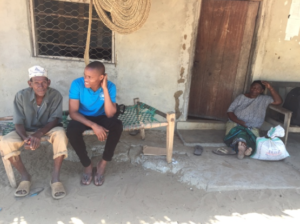 In the fourth contribution to this volume, the Legal and Human Rights Centre (LHRC) takes an in-depth look at a longstanding conflict related to tourism investment in one of Tanzania’s national parks. The study “Tourism and land rights: case study of Uvinje sub-village and Saadani National Park” aims to unravel the causes for the continued land dispute between Uvinje community and Saadani National Park Authorities, which has been ongoing since the 1990’s. LHRC assesses whether community land rights were safeguarded during the establishment of Saadani National Park, which human rights were violated as a result of this conflict and whether or not human rights due diligence was undertaken prior to this example of tourism investment. Suggestions are formulated on the best way forward for this specific conflict and for human rights due diligence prior to tourism investment in general.
In the fourth contribution to this volume, the Legal and Human Rights Centre (LHRC) takes an in-depth look at a longstanding conflict related to tourism investment in one of Tanzania’s national parks. The study “Tourism and land rights: case study of Uvinje sub-village and Saadani National Park” aims to unravel the causes for the continued land dispute between Uvinje community and Saadani National Park Authorities, which has been ongoing since the 1990’s. LHRC assesses whether community land rights were safeguarded during the establishment of Saadani National Park, which human rights were violated as a result of this conflict and whether or not human rights due diligence was undertaken prior to this example of tourism investment. Suggestions are formulated on the best way forward for this specific conflict and for human rights due diligence prior to tourism investment in general.
Finally, the project manager of the International Peace Information Service (IPIS) in Tanzania presents new data on “Limestone mining and human rights issues in Kigoma Region. A case study on limestone mining communities in Makere”. In Kigoma, mining communities rely heavily on land and resources in the Makere Forest Reserve for their livelihood. This has given rise to tensions with forest authorities, that are mandated with enforcing laws and regulations that discourage human activities in reserves. By looking into a subject and region that have been overlooked in studies on mining, human rights and conservation so far, this contribution sheds a light on human rights violations that have remained unreported and whose victims have limited access to redress and remedy.
Despite their geographical and topical diversity, one clear message emerges from all five “Voices from Tanzania” case studies: raising awareness on the fundamental principles of business and human rights – including how to effectively access remedy – is a crucial necessity towards the realisation of human rights for all in Tanzania.
Download the publication in pdf
To stay up to date on Business and Human Rights in Tanzania, subscribe here
Join the conversation on Twitter #bizhumanrightsTanzania
———————————————————

“Voices from Tanzania” is a collaboration between Tanzanian civil society organisations, the Tanzanian Commission for Human Rights and Good Governance (CHRAGG), Business and Human Rights Tanzania (BHRT) and the International Peace Information Service (IPIS). This publication is part of the ‘Improving monitoring, research and dialogue on Business & Human Rights in Tanzania’ project implemented by CHRAGG, BHRT and IPIS, with the financial support of the European Instrument for Democracy and Human Rights.

